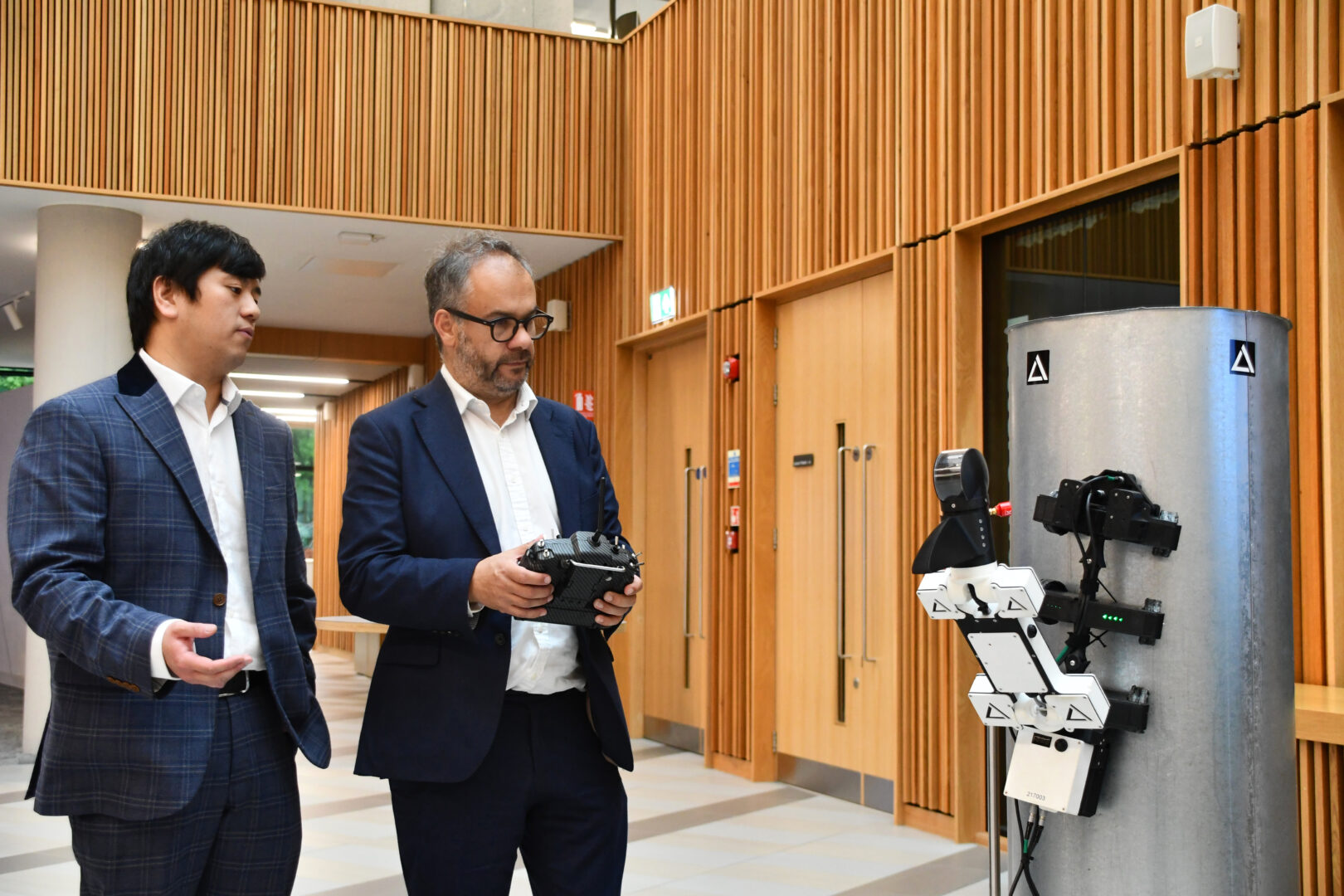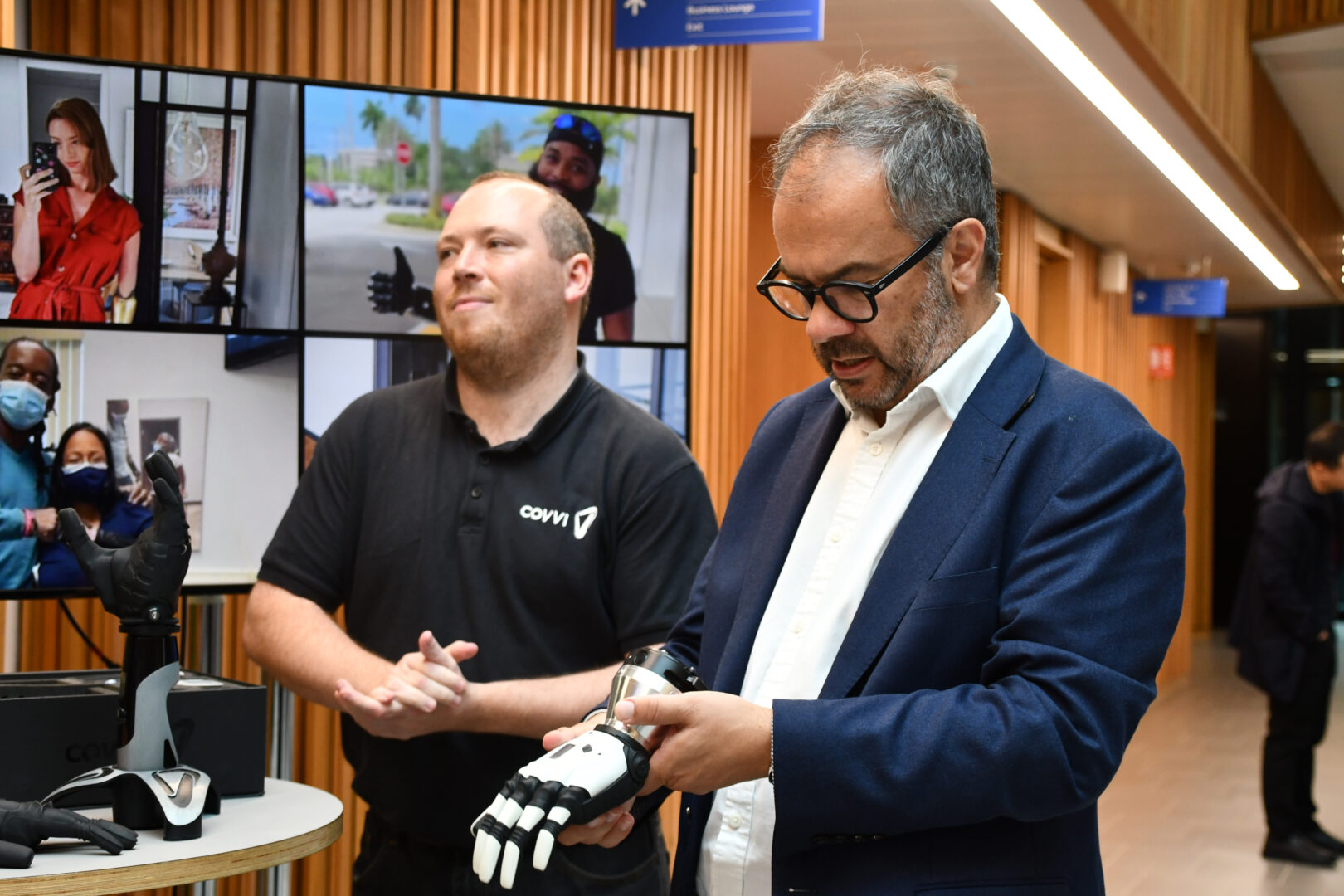Minister visits Nexus to explore digital technology

The Minister responsible for UK digital and tech policy has visited the University of Leeds, as a part of the Leeds Digital Festival Programme, to see how the city region is developing innovative digital technologies.
Paul Scully MP, Parliamentary Under Secretary of State (Minister for Tech and the Digital Economy), visited Nexus, the University’s innovation community, to meet with Professor Nick Plant, Deputy Vice-Chancellor: Research and Innovation, Gareth Scargill, Nexus Director, and member businesses to learn more about the region’s strengths in digital technology.
The companies that he visited included:
- Acuity Robotics – a spin-out of the University of Leeds’ Real Robotics laboratory, which has built the world’s smallest proprietary robots to climb metallic structures that are difficult, costly or impossible to access by humans or drones.
- Yondar – a STEM specialist that is developing an AI-based marking tool for teachers to cover basic quantitative marking, such as multiple-choice questions, giving teachers more time to focus on qualitative assessments and course development. Yondar is also working closely with Space Hub Yorkshire.
- Diverse & Equal – a member of the Nexus community that is striving to improve innovation in digital tech by increasing the number of talented people from black and under-represented backgrounds in the industry.

The Minister also met with Simon Pollard, CEO and John Wilkinson, Production Lead, from COVVI, which has headquarters in Leeds and more than 75 years of combined experience in prosthetic design. Since 2017, COVVI’s main objective has been to design and deliver a world-leading, multi-articulated bionic hand that is both highly functional and accessible.
The COVVI Hand was developed to be at the forefront of the global bionics industry and aims to change the lives of users forever through innovative technology. The hand was even featured recently on BBC News, ITV’s Good Morning Britain and it even made a small cameo in the new Barbie movie.
Paul Scully, Minister for Technology, said: “Visiting Nexus has showcased the brilliant innovation and purpose-driven tech that the UK is pioneering. From groundbreaking robotics developments, game changing AI solutions and tech for good companies improving diversity in the sector.
“Leeds is not just a hub of innovation but a testament to our nation’s commitment to creating meaningful, transformative solutions for our society. Our future in tech has never looked brighter.”
He also visited the University of Leeds’ Bragg Centre for Materials Research, which aims to discover, create and design new materials.
The centre brings together scientists and engineers across a wide range of disciplines to work on analytical science, bionanotechnology, electronic and photonic materials, functional surfaces, multiscale materials and soft matter.
The Bragg Centre works with industry and other partners to develop insights and solutions for the development of innovative products, devices and applications. The University is a founding partner of the Henry Royce Institute, the UK’s centre for advanced materials research and innovation. The Centre also has strong support from the Engineering and Physical Sciences Research Council (EPSRC).
The Minister met with Professor Nora de Leeuw, Executive Dean of the Faculty of Engineering and Physical Sciences, and Professor Giles Davies, Deputy Executive Dean of the Faculty, to discuss the vision for the Bragg Centre, its world-leading research and state-of-the-art facilities. The Centre also has a strong focus on providing training, developing the next generation of research leaders and innovators.
He also met with researchers in the Royce Deposition Laboratory to understand how the University is designing the materials for future electronic devices, with a specific focus on energy efficiency in support of the delivery of net-zero targets.
Professor Nick Plant, Deputy Vice-Chancellor: Research and Innovation, who welcomed Mr Scully, said: “Digital technologies are central to delivering the University’s Strategy. Through their effective, creative, and innovative use our world-leading researchers are tackling global challenges, while research-informed education enhances our students’ learning experience and prepares them to be global citizens and leaders.
“It was a pleasure to welcome Paul Scully MP to the University to showcase our innovative digital technologies and the work we are doing on semiconductors in our state-of-the-art Bragg Centre.”
Professor Edmund Linfield, Director of the Bragg Centre for Materials Research, said: “I enjoyed speaking to the Minister today about how the University of Leeds can contribute to the UK’s Semiconductor Strategy, in collaboration with the Henry Royce Institute, from supporting industry in prototyping new device concepts, through to undertaking cutting-edge research on energy efficient and sustainable electronics, and helping develop the semiconductor skills which the UK urgently needs, both now and in the future.”
Stuart Clarke MBE, Festival Director, Leeds Digital Festival, added: “Leeds Digital Festival has been growing from strength to strength each year and it is a pleasure to have the Minister for Tech and Digital Economy with us, to contribute to the conversation and see all the fantastic innovation and digital enterprise that is happening in the Leeds City region and beyond.”
Further Information
For more information, please contact Rebecca Hurrey in the University of Leeds press office on r.hurrey@leeds.ac.uk
Picture Credit: Jodie Rhoden

Nexus Summer BBQ
event | Networking | Social
